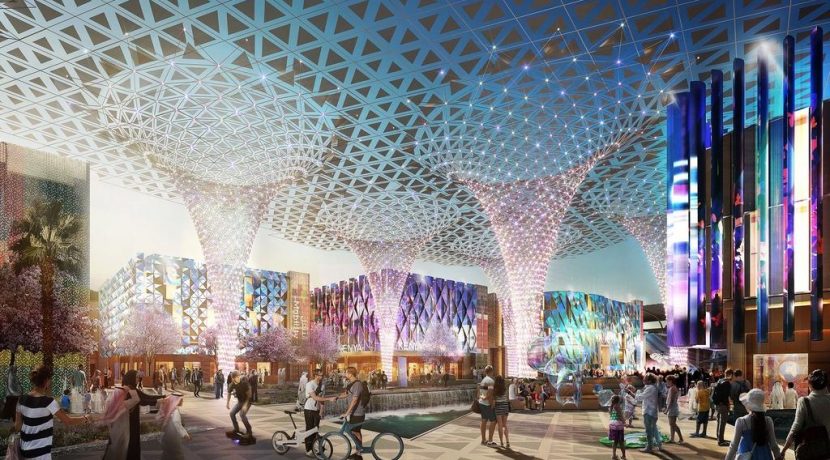There is plenty of speculation around Expo 2020 in terms of how much it will spur the real estate market in Dubai, if at all.
Expo 2020 is perhaps the biggest event the UAE has ever hosted and judging from the anticipated after-effects and heightened awareness the event will bring, particularly in a city that has generally outpaced development predictions, it should come as no surprise to anyone that the effect will be profound.
Based on projections with respect to the Expo as well as tourism targets, the government has estimated future requirements at about 160,000 hotel rooms. As per the Dubai Tourism website, the supply as of April stands at 118,500 rooms. In addition, there are approximately 6,000 active Airbnb listings on their website.
A further 25,000 hotel/hotel apartment units are due to be delivered by 2020. It is important to note that Dubai isn’t just building solely for the Expo. The city is building to keep up with its own growth. The Expo should be viewed as a major stimulus in achieving long-term growth aspirations.
Once you factor in the growing number of tourists and the increasing population, which is expected to reach 5 million people by 2027, it becomes apparent where the demand for real estate would emerge from. The construction sector has consistently been one of the biggest contributors to Dubai’s GDP, accounting for Dh24.6 billion or 6.3 per cent in 2017.
Unsurprisingly, the government has forecast that the GDP will increase from an anticipated 2.1 per cent this year to 3.8 per cent in 2020, followed by a drop to 2.8 per cent in 2021. This sizeable increase will be due to the influx of visitors during the Expo event and the direct, indirect and induced impact that this will bring to the GDP.
The only time the GDP actually dropped compared to the previous year was in 2009 as a result of a major global crisis. While the growth rate may moderate following the Expo year, it is certainly expected to continue to grow.
The other question is one of the impact the event will have on other industries. The spike in anticipated number of visitors during the Expo year will inevitably have a knock-on effect on other sectors. As per an economic impact assessment conducted by consultancy firm EY, the event will contribute an additional 1.5 per cent to Dubai’s GDP.
Local banks will continue to be involved in a variety of real estate related projects. We often provide asset-backed finance on operational assets based on their income generating potential but are increasingly also involved in construction finance.
Sustainability beyond the Expo is a widely debated and speculated subject. All major indicators — including GDP, population, geographical footprint and tourism inflows — indicate a growth trend.
Notably, the government has recognised that major events such as the Expo, the Olympics and the Fifa World Cup often lead to massive amounts of investment, which is then left neglected and abandoned in the years to come. A legacy programme has thus been created which will ensure that approximately 80 per cent of the Expo’s buildings and structures will be incorporated into a new business zone called District 2020, with major corporations such as Accenture and Siemens said to be confirmed as major tenants.
Additionally, another major exhibition centre will be created at the site to host other major events. However, there remains the risk of debt repayments owed by government-related entities, which is estimated at $60 billion, about half of which is due by 2021.
In the short- to medium-term, the real estate sector’s contribution towards the GDP is expected to remain consistent. The economy, and especially the real estate market moves in cycles. A number of factors have contributed to the slow down over the last three to four years, including a stronger dollar, lower oil prices, political headwinds, regional instability, fear of oversupply, negative sentiment, etc.
It is important for one not to always compare to the peak of the cycle. To compare GDP growth, property prices, job creation, license issuances, property sales, etc, to its highest point is bound to create negative sentiment. If assessing long-term averages and absolute figures, the relatively modest growth that is anticipated in the years to come will start appearing to be the new normal and more importantly, will be more sustainably achievable.
Naturally, the government will have an important role to play. Reforms are an ongoing theme in this market. The several government initiatives during the early years in the 1970s to the present day have been significantly impactful.
Some recent and ongoing reforms to stimulate the market and make it more attractive for businesses and people to relocate here include an aim to make the city more affordable, ease the issuance of business licenses, enable the issuance of long-term visas, the creation of various incubators to encourage start-ups and the knowledge economy, as well as softer initiatives such as creating an environment of tolerance where all nationalities and backgrounds are welcome to conduct business and live in cohesion.
That said, since the city, the country, the region and the construction sector are constantly evolving, it is important to keep pace with required changes. Dubai has regionally been the most active and most progressive city in this regard.
Going forward, the existing relationship between the public and private sector may be enhanced to create and exchange new ideas, improve transparency, implement best practices and embrace technological disruption in order to ensure greater relevance, integration and continual progress.
This, in my view, will ensure growth in 2020 and beyond.
Zain Qureshi is Managing Director and Head of Real Estate Finance and Advisory, Mashreq Bank.
All rights reserved to the initial publisher for Gulf News.
Collected and published by Arms &McGregor International Realty® editorial team. Get in touch with us at [email protected]

